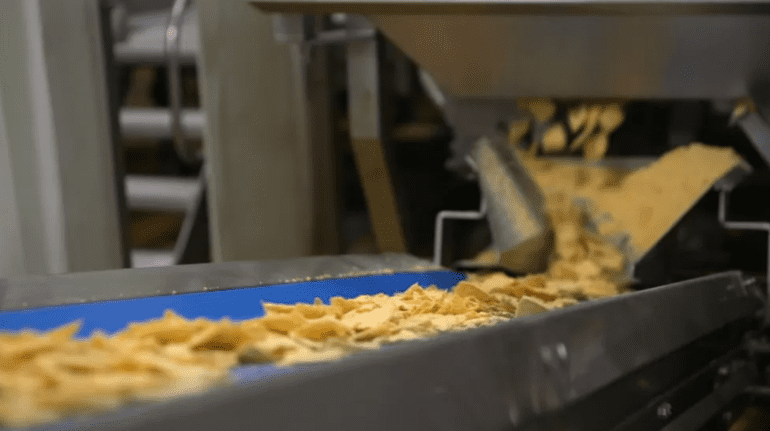TL;DR:
- AI-powered sensors are transforming manufacturing by detecting hardware faults and enhancing efficiency.
- PepsiCo is deploying these sensors in its factories to predict and prevent disruptions.
- AI’s data processing capabilities are invaluable for manufacturers.
- Computer vision is used to identify product defects at scale.
- AI offers opportunities for capacity sharing and supply chain visibility.
- AI can reveal supply chain details and environmental impact.
- Concerns about the workforce’s future role are being addressed with AI applications.
- Augury’s technology not only future-proofs factories but also improves worker and customer experiences.
Main AI News:
In today’s fast-paced manufacturing landscape, the integration of artificial intelligence (AI) is revolutionizing production lines. At Coventry’s PepsiCo factory, where some of the UK’s most beloved snacks like Doritos, Walkers, and Wotsits are produced, the constant hum of machinery almost drowns out human voices. However, it’s not just human workers who are attentive to the factory’s relentless rhythms. Cutting-edge sensors, meticulously crafted by tech firm Augury and driven by AI, are diligently scanning for any signs of hardware malfunction that could potentially disrupt the production process.
Following a successful trial in the United States, PepsiCo is now implementing these state-of-the-art sensors throughout its factories. The company is among many industry leaders exploring the transformative potential of AI in enhancing factory efficiency, minimizing waste, and expediting product delivery. AI’s unique capacity to process and analyze vast volumes of data is already proving invaluable in helping manufacturers anticipate and mitigate potential disruptions.
In an industry where every minute of factory downtime translates to substantial financial losses, and extended delays can result in missed consumer demand during critical periods such as the festive season or Black Friday, the demand for real-time process monitoring and predictive analytics tools has soared. The sensors deployed in PepsiCo factories have been meticulously trained on massive datasets of audio data, enabling them to identify faults like conveyor belt wear and bearing deterioration while analyzing machine vibrations.
Saar Yoskovitz, the CEO of Augury, underscores the significance of this data-driven approach: “We have today over 300 million hours of machines that we’ve analyzed and monitored, and we can leverage all this data to create algorithms that know how to pinpoint specific patterns of different malfunctions.” This proactive approach to maintenance scheduling allows workers to address potential issues before they lead to machine errors, reducing costly disruptions.
AI-powered sensors also offer a compelling solution to reducing waste across operations. As Mr. Yoskovitz explains, “If the machine is working in the most optimal way, you can reduce the energy consumption of that machine.”
Another facet of AI making its mark in factories worldwide is computer vision, which involves training machines to identify objects in images and video. This technology is instrumental in detecting product defects on a large scale, especially for items moving rapidly along conveyor belts and through sorting machines. Even intricate products like computer chip wafers and circuit boards, with their delicate designs and components, can now be thoroughly examined by machine cameras and algorithms designed to spot specific surface-level anomalies.
Professor Alexandra Brintrup, an expert in digital manufacturing at the University of Cambridge’s Institute for Manufacturing, believes that AI’s impact on manufacturing extends beyond improving efficiency and quality control. She envisions exciting opportunities in areas like capacity sharing between manufacturers and enhancing visibility in supply chains, potentially revolutionizing logistics chains by sharing resources like trucks.
Moreover, the complex and interconnected nature of supply chains has historically been shrouded in secrecy, with some stakeholders reluctant to disclose their suppliers. AI can play a pivotal role in analyzing and predicting supplier information, offering companies insights into bottlenecks and consumers transparency about the origins of their products and materials used.
Despite the promise of AI in manufacturing, questions about its implications for the workforce remain. Some companies are exploring AI applications to ensure the safety of production line workers by using machine learning and computer vision to identify potential threats or accidents through factory camera feeds. Additionally, AI-powered wearables, such as exoskeletons, have been deployed in UK warehouses to protect workers from strain and injury when handling heavy loads.
David Schwartz, the Global Vice President of PepsiCo Labs, emphasizes that the integration of Augury’s sensors and AI is not just about future-proofing factories but also about enhancing the value delivered to workers and customers. “It’s helping enhance how people work, so we can bring better efficiency to meet the needs of our people, of our customers, and we can be prepared to lean into the future to meet their needs on a daily basis,” he affirms.
Conclusion:
The integration of AI in manufacturing, exemplified by PepsiCo and Augury’s partnership, signifies a fundamental shift in the industry. AI-driven sensors, predictive analytics, and computer vision are streamlining operations, reducing waste, and enhancing supply chain transparency. This technological evolution not only boosts efficiency but also underscores the imperative of adapting to the future of manufacturing to meet customer needs and ensure worker safety. Businesses that leverage AI in similar ways can expect to stay competitive in a rapidly changing market.

